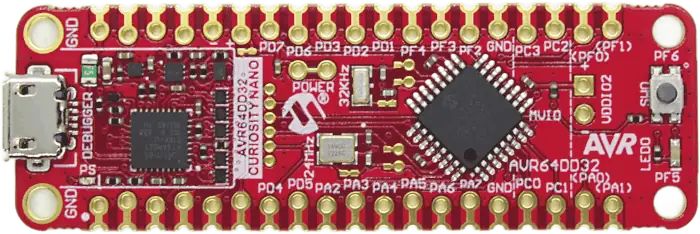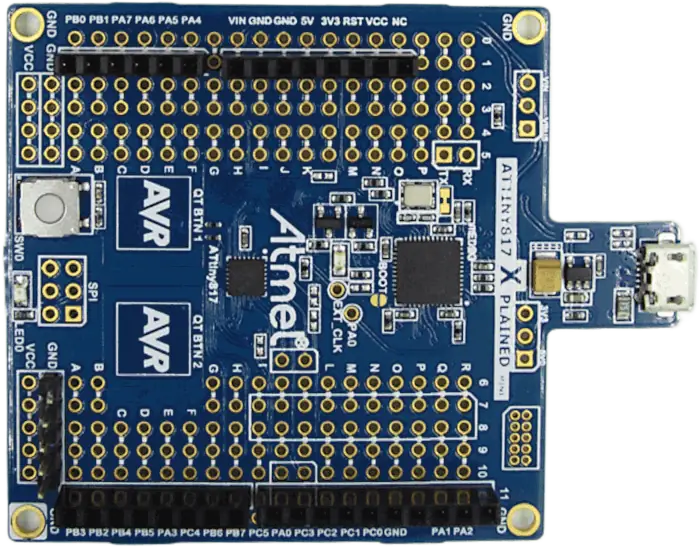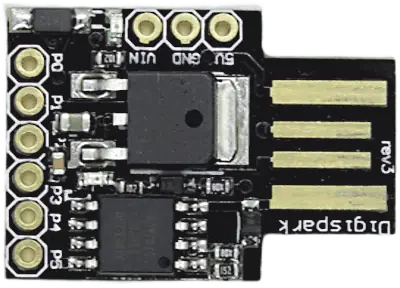An evaluation board — also known as a development board or evaluation kit—is a pre-assembled circuit board designed to help developers, engineers, and hobbyists experiment with a specific microcontroller or system-on-chip. These boards provide everything needed to start prototyping, learning, or debugging, without needing to build a circuit from scratch.
For those working with AVR 8-bit microcontrollers, Microchip offers a wide range of evaluation and development kits to suit every experience level.
Table of Contents
Why Use an Evaluation Board?
Using an evaluation board saves time and lowers the barrier to entry for embedded development. Here’s what makes them useful:
- Pre-soldered microcontrollers with headers or USB connections. Allows easy access to surface mount microcontroller chip pins.
- Built-in debugging interfaces for easy programming and testing.
- Breakout pins for connecting external peripherals.
- Power supply options including USB or external battery / PSU inputs.
Key Evaluation Board Terms Explained
- Development Board / Demo Board: A general-purpose board designed for development work. This simplified board is meant to demonstrate the capabilities of a microcontroller.
- Evaluation Kit: Often includes the board plus accessories like cables and software tools.
- Microcontroller Board: Refers to any board that contains and supports a microcontroller chip.
Popular AVR Evaluation Boards
1. AVR Curiosity Nano Evaluation Board
The AVR Curiosity Nano series is ideal for modern 8-bit AVR development. Features include:
- On-board debugger and programmer (no external tools needed)
- USB-powered and programmable
- Easy integration with MPLAB X IDE
- Compatible with a wide range of 8-bit AVR chips
There are Curiosity Nano boards for many AVR devices, including the ATmega4809 and ATtiny817. The following image shows the evaluation board from the AVR64DD32 Curiosity Nano Evaluation Kit.

2. ATtiny817 Xplained Mini Evaluation Board
The ATtiny817 Xplained Mini is a feature-rich board designed specifically for the ATtiny817 microcontroller. It’s well-suited for hobbyists and professionals wanting to explore UPDI-programmed AVRs.
Key features:
- On-board mEDBG (Microchip Embedded Debugger)
- UPDI programming support
- USB communication
- Fully compatible with Atmel Studio and MPLAB X IDE
An ATtiny817 evaluation board is shown in the image below. It is the ATTINY817 XPLAINED MINI from Microchip.

3. Digispark ATtiny85
The Digispark ATtiny85 is a compact, low-cost microcontroller board based on the ATtiny85. It connects via USB and can be programmed using the Arduino IDE, making it perfect for makers and beginners.

- Tiny form factor
- USB plug-and-play
- Community-supported Arduino board definition
- Great for simple LED blinking and sensor-based projects
Choosing the Right Evaluation Kit
When selecting an evaluation board, consider:
- Microcontroller architecture: Does it use UPDI, ISP, or other protocols?
- Debugging interface: Does it include on-board programming tools?
- Software compatibility: Will you be using MPLAB X IDE, Atmel Studio, or Arduino IDE?
- Community and documentation: Is there active community support and examples?
Software Tools for AVR Development Boards
To get the most out of your AVR evaluation board, you’ll likely use one of these tools:
- MPLAB X IDE: Microchip’s official IDE with full support for debugging and programming AVR and PIC devices.
- Arduino IDE: Widely used for Digispark and ATmega328-based boards. Great for beginners.
- Atmel Studio: Legacy tool with deep AVR support, now largely replaced by MPLAB X.
Conclusion
An AVR evaluation board or development kit is the easiest way to get started with 8-bit AVR microcontrollers. Whether you’re exploring the power of the ATtiny817 Xplained Mini, the flexibility of the Curiosity Nano, or the simplicity of the Digispark ATtiny85, there’s a solution for every project and budget.
Ready to dive into AVR programming? Grab a board, connect it to your PC, and start building your next project today.
You may be interested in our article on how to choose the best AVR programmers.
